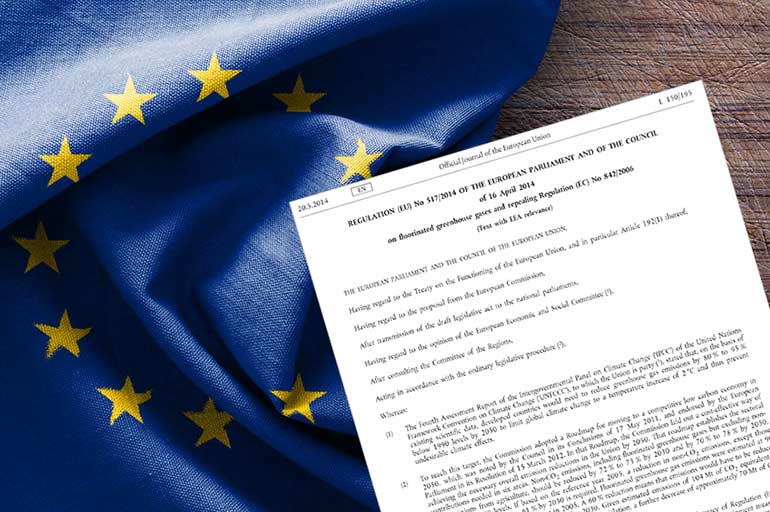Latest on the F-gas Review
The objectives of the forthcoming F-gas Review were discussed by DG CLIMA at the recent (February 2022) F-gas Industry Gathering. A large group of associations and companies offered their thoughts on how the review might interact with the EU PFAS REACH restriction proposal. EFCTC collected notes of comments made by DG CLIMA at the meeting (shared below), but noted that any misinterpretations are the responsibility of EFCTC. Much of the information shared by DG CLIMA is already well known but these notes provide a coherent overview of the latest position.
EU F-gas Review
DG CLIMA aim to have a proposal adopted in April 2022. According to DG CLIMA, the current regulation is already quite good, it only requires some fine tuning to make sure it delivers on its objectives better. Together with the proposal, the impact assessment of the measures considered and a background study including the assumptions will also be published. Once the proposal is adopted by the European Commission, the discussion and dialogue move to the Parliament and Council co-decision process, which will result in changes before the final adoption of the new rules.
DG CLIMA outlined 5 main objectives for the review:
- Prevent further emissions

- Avoid demand for new equipment
- Better containment and recovery
- Alignment with the Montreal Protocol: considering what is useful to align, difference will remain for pre-charged equipment
- Take measures to improve enforcement of the regulation, notably in relation to customs procedures
- More comprehensive monitoring system
- Improving clarity and coherence with other legislations
For each objective, DG CLIMA noted that they had looked at a long list of possible measures and have bundled those measures into different options/packages (some of this was discussed at the May 2021 stakeholder meeting).
A few key issues were discussed:
Illegal Trade: DG CLIMA urgently wants a link with Customs Single Window (SW). The SW will be important as it will be mandatory for all Member States and it will be linked to the F-gas Portal, an automated system that inform customs whether a product may be placed on the market.
Climate Policy: The F-gas Regulation is a key pillar in the EU climate policy architecture and the proposal must align this policy with Fit For 55 objectives. The measures taken now (or not) will have a long-term effect. There is a need to avoid high GWP F-gases in new equipment and the whole lifecycle must be taken into account.
Decarbonising heating: DG CLIMA underlined that a high growth in heat pumps is necessary and consistent with the F-gas policy as it has always been the philosophy that F-gases should be replaced where technically feasible with low GWP alternatives, without affecting the availability of the type of equipment itself.
Alignment with the Kigali Amendment: The EU is currently well below the cap in terms of HFC consumption, but this cannot be guaranteed in the future. It is complex because the metrics for the calculation of consumption under Kigali and F-gas are different. For instance, under Kigali, HFCs for MDIs are counted as consumption whereas they are exempted under the F-gas Regulation. On the other hand, quota authorisations are counted under the F-gas Regulation Article 15(2)f but not under the Kigali consumption metric. DG CLIMA has developed a worst-case scenario for 2030 showing that by this date, the EU would not necessarily meet Kigali targets, with MDI exemptions regarded as the "main issue". In addition, the F-gas exemption of 100tCO2e HFCs will need to be removed for bulk HFCs to align with Kigali but, for equipment authorisations, should remain to safeguard the environmental integrity.
Coherence with other regulations: There is a need to ensure coherence, notably with customs rules.
Mechanism to implement changes to provisions more rapidly: DG CLIMA are considering that there is a need to have a mechanism that would allow the Commission to adjust certain measures rather rapidly, if that is clear need to do so, without having to go through the whole legislative procedure that may take two years or more or until the next revision of the regulation.
EU F-gas Review and PFAS
At this stage there remains no clarity about the outcome of the PFAS restriction proposal. DG CLIMA stated that it is too early to judge where the borders will be but hoped that the F-gas proposal will help remove the uncertainty. The aim is to create certainty for investments through the Review outcome.
UK F-gas Review
UK Defra participated in the meeting and made the following points from a UK perspective:
- Keen to have trainings and certification for non-fluorinated refrigerants as well.
- Intend to regulate HFOs under the UK F-gas Regulation. Defra are keen to avoid double regulation and they view HFOs as viable alternatives, but they need to be controlled and reported.
The target for the UK is not necessarily to be aligned with Kigali, but to go further: achieve net zero, but the MDIs current exemption might affect the UK's phase down.
Image: ©Coolingpost